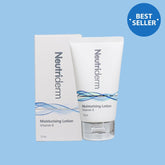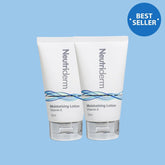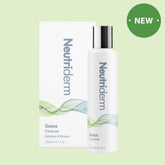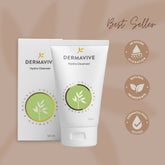How to Incorporate Vitamin C into Your Skincare Regimen for Glowing Skin
Like any art, our skin needs the right tools and ingredients to shine. One such essential component is vitamin C.
In today's world, our skin is constantly bombarded by environmental stressors, pollution, and the sun's harsh rays. These factors can wreak havoc on our complexion, leaving it dull, lackluster, and prone to damage. That's where vitamin C comes in as a skincare superhero. This powerful antioxidant acts as a shield, protecting your skin from harmful free radicals and promoting a healthier, more radiant glow.
Why is vitamin C so crucial for your skin?

The Benefits of Vitamin C for Skin
1. Brightens and Evens Skin Tone.
2. Vitamin C helps to inhibit melanin production, the pigment responsible for dark spots and hyperpigmentation.
3. This can result in a brighter, more even complexion.
4. Boosts Collagen Production
Collagen is a protein essential for maintaining youthful, plump skin. Vitamin C is a key cofactor in collagen synthesis, helping to reduce the appearance of fine lines and wrinkles.
5. Protects Against Sun Damage
While sunscreen is crucial for UV protection, vitamin C can help to minimize the damage caused by sun exposure, reducing the risk of sunburn and long-term photoaging.
6. Enhances Skin Barrier Function:
A healthy skin barrier is essential for retaining moisture and preventing irritants from penetrating the skin. Vitamin C can help to strengthen the skin barrier, leaving it feeling hydrated and supple.
Exfoliating with Vitamin C: A Power Duo for Radiant Skin
Exfoliation is a vital step in any skincare routine, as it helps to remove dead skin cells, unclog pores, and promote cell turnover. When combined with the antioxidant properties of vitamin C, exfoliation can be even more effective in revealing a brighter, smoother complexion. One of the best Vitamin-C exfoliants in the market is Neutriderm C Scrub, it is dermat recommended and comes with a hoard of other ingredients that help in enhancing its productivity.
How Vitamin C Enhances Exfoliation

1. Enhances penetration
Vitamin C can help to soften the skin's surface, allowing exfoliating agents to penetrate deeper and work more effectively.
2. Boosts cell turnover
By stimulating collagen production and promoting cell renewal, vitamin C can help accelerate the shedding of dead skin cells, revealing a fresher, more youthful-looking complexion.
3. Brightens skin
Vitamin C's exfoliating action can help reduce the appearance of hyperpigmentation and dark spots, resulting in a more even skin tone.
4. Vitamin C is best paired with Stearic Acid
This versatile ingredient plays a crucial role in the formulation of vitamin C products. It acts as a bridge between oil and water-based components, ensuring that the product has a smooth, creamy texture and is easily absorbed into the skin. By creating a stable emulsion, stearic acid helps to prevent the separation of ingredients and ensures that vitamin C remains evenly distributed throughout the product.
5. Salicylic Acid
Often used in acne treatments, salicylic acid also has exfoliating properties that make it a valuable addition to vitamin C products. It gently removes dead skin cells, unclogs pores, and reveals a brighter, more radiant complexion. By removing the buildup of dead skin cells, salicylic acid allows the vitamin C to penetrate deeper into the skin, where it can exert its antioxidant benefits more effectively.
6. Olea Europaea (Olive) Fruit Oil
This natural ingredient is rich in fatty acids and antioxidants that can nourish and protect the skin. Olive oil helps to moisturize the skin, preventing dryness and flakiness. It also acts as a natural barrier, helping to protect the skin from environmental damage and loss of moisture. By providing a healthy, hydrated base, olive oil enhances the absorption and effectiveness of vitamin C.
7. Hydrogenated Castor Oil
Similar to stearic acid, hydrogenated castor oil is an emulsifier that helps to blend oil and water-based ingredients. It also adds viscosity to the product, making it easier to apply and preventing it from spreading too thin. By providing a stable foundation, hydrogenated castor oil helps to ensure that Vitamin C is evenly distributed and can penetrate the skin effectively.
8. Glycerin
This humectant is a popular ingredient in skincare products due to its ability to draw moisture into the skin. Glycerin helps to prevent dryness and flakiness, leaving the skin feeling soft and hydrated. By keeping the skin well-moisturized, glycerin can enhance the absorption of Vitamin C and other active ingredients.
9. Glycine Soja (Soybean) Oil
This natural oil is rich in essential fatty acids and phytoestrogens that can nourish and revitalize the skin. Soybean oil helps to improve skin elasticity, reduce the appearance of fine lines and wrinkles, and promote a healthy, youthful complexion. By providing a nourishing environment, soybean oil can help to enhance the effectiveness of vitamin C and other antioxidants.
10. Maltodextrin
This carbohydrate is often used as a carrier in skincare products to help deliver active ingredients to the skin. Maltodextrin helps to stabilize vitamin C, preventing it from degrading over time. It also adds viscosity to the product, making it easier to apply and ensuring that the vitamin C is evenly distributed.
You can get a Vitamin-C exfoliant that carries within itself the goodness of all the above ingredients!
Neutriderm C Scrub is an innovative exfoliant that harnesses the potent
Antioxidant properties of vitamin C to reveal a brighter, more youthful complexion.
Unlike harsh, abrasive scrubs that can leave your skin feeling raw, Neutriderm C Scrub is formulated with gentle, natural exfoliants that gently remove dead skin cells without irritating them. This gentle exfoliation action promotes healthy skin renewal, revealing a fresh, radiant glow.
Infused with a concentrated dose of Salicylic acid, this scrub helps to brighten your skin, reduce the appearance of dark spots, and promote a more even complexion. Over time, you'll notice a visible improvement in your skin's texture and tone, as the scrub helps to refine pores and smooth the skin's surface.
FAQ’s
Q: How long does it take to see results from using vitamin C?
A: Results may vary depending on individual skin types and concerns. However, many people report seeing improvements in skin tone, texture, and brightness within a few weeks of consistent use.
Q: Can vitamin C cause irritation?
A: While vitamin C is generally well-tolerated, some people may experience mild irritation or redness. If you have sensitive skin, it's a good idea to patch-test the product before applying it to your entire face.
Q: What are some good dietary sources of vitamin C?
A: Citrus fruits, berries, bell peppers, broccoli, and kiwi are all excellent sources of vitamin C. Incorporating these foods into your diet can provide additional benefits for your skin.







